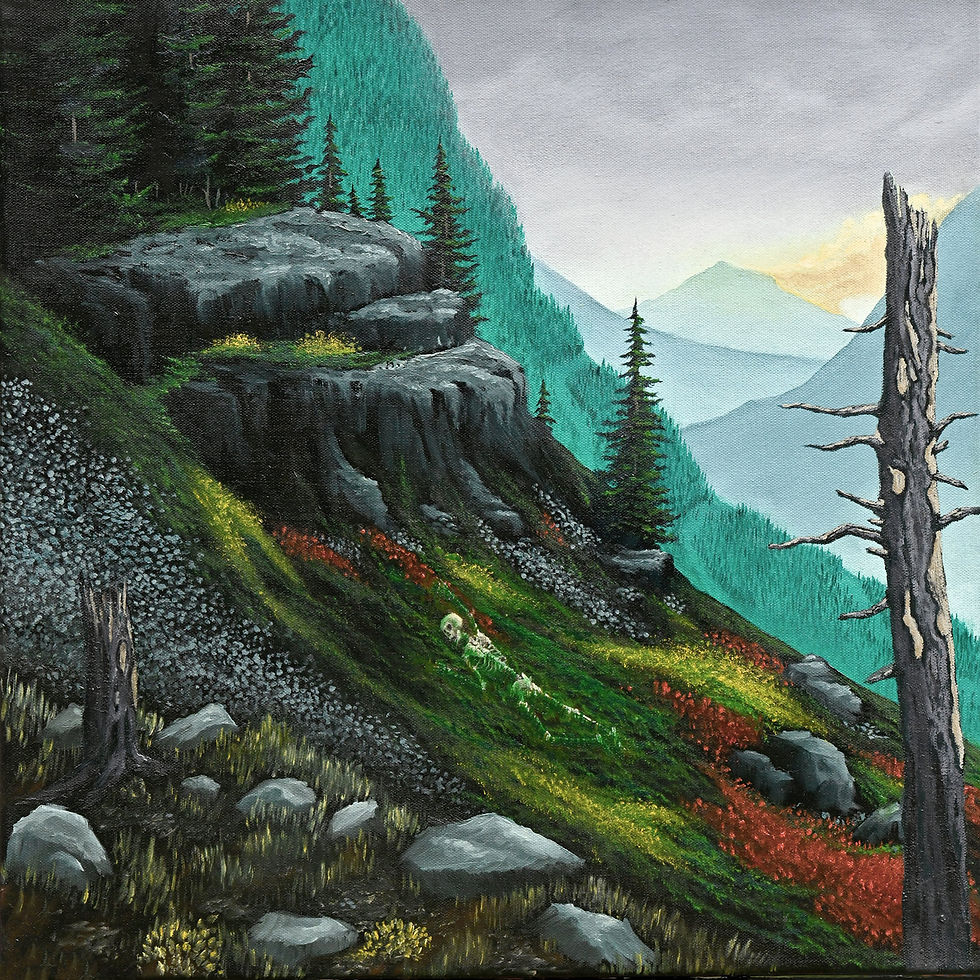The Sacred Hearth: Alda - A Distant Fire Review
- Jake Sanders
- Sep 30, 2021
- 6 min read
Updated: Oct 5, 2021
The quartet from the PNW rekindle their flame of sound in this primeval epoch.

Words by Jake Sanders (@themetalscholar):
The leaves have fallen, the tides have risen, and the trees have burned far too many times, since the last occasion audiences were graced by new music from the four distinguished members of Alda.
For those unfamiliar with their brief but poignant catalogue, this outfit from Tacoma, Washington is directly responsible for bearing the atavistic crown of blackened folk metal, a task that they approach with heart-rending proficiency. Tahoma (2011), a love letter to their natural world in the Pacific Northwest, took the barebones structure of their pure self-titled release and imbued within it the soul of a primal being at-home in deep woods. Whether through water, wood, or ashes, the group set about telling a story of creatures whose symbiotic relationship with the natural world both nourished their bodies during their time in this mortal coil, and graciously accepted their return to the earth upon their passing. Simple and sovereign, mother nature's indifference to all is showcased in humble repose through five tracks of near-perfect harmony, a work that strays from acoustic to caustic in just over fifty minutes.
Though the task was daunting, and the shadow of its predecessor was as tall as the literal mountain its name is derived from, the third offering from the group came in 2015, a stunning overture of Cascadian mastery that was steeped in atmosphere, wide dynamic production, and ambient interludes that featured a sample from Jeremiah Johnson, and the sounds of punishing rain beating down upon the open world. Courting a significantly more dire and morose sound, Passage (2015) delivered a tone that sought to counter its own previous offering with a story of scars left on the world, and an everlasting despair that speaks from the wisdom of age, and the hope left to wither for a natural world that continues to shrink.
The quality of songwriting and musicianship on display in Alda's discography can not be overstated, and though their sound has undergone characteristic shifts in attitude that change like the seasons, the constant that remains is that listeners can, and will be grounded by the layers upon layers of harmonic delivery that await around each new turn.
Today, this critic, along with countless others, can rest easy knowing Alda has returned after six long years, and they've brought with them the fourth seed of organic growth, a whole package gifted under the moniker, A Distant Fire.
Springing up from a thaw after a long winter, First Light sets the tone of the album with an eternally familiar presence of signature sound, the twinkling, and gentle plucking a subtle, and humble beginning that comprises the same thoughtful dawn of creation their entire discography exudes. This time around, they've chosen the path that builds layer on layer, a series of acoustics tempered by the soft thump of a minimalistic kick-drum. Along with a soft serenade on viola by Marit Schmidt, it's abundantly clear from this record's inception that Alda has no illusions about what they want to sound like. This is unquestioningly the essence of who they are, and longtime listeners are going to appreciate how much care is placed on easing people back into the spiritual, and compositional mindset of everything this group does best.
There's a warmth to this album. More than just its namesake, the mix this time takes a hard right turn down the equalizer, casting out the wide array of sound that favors the kit to a much more tonally balanced framing, a craft that audiences will immediately recognize for its use last year in Uada's third album, Djinn (2020). Collaborating musically, and spiritually, Jake Superchi lends a helping hand this time around both behind the console and in front, wielding both an axe and an ear to the equation. It's a match made in Valhalla, as not only does Alda sound fresh this time around, but the richness of the mix is neither overpowering, nor favored towards one side or the other. Live drums feel very much alive, and it can't be overstated how quickly this new sound feels less over-encumbering than a typical current black metal release, in recent days.
Guitars feel nice and even, straining little to none while showcasing a full mid-range during Stonebreaker, all up-front, as a sliding scale generously rides up and down the neck. In much the same style as audiences are familiar, this riff is merely introductory, an auditory show of force that is clean and calculated, fading away after a minute to give life to the meat and potatoes of the track, a dirty riff that bleeds from one measure to the next with reverberating strength, a hallmark of the Alda sound signature. Vocals are customary at this point, and more importantly, this time around they take a much more prominent role. Passage, while instrumentally dense, and powerful enough to carve deep trenches with its fidelity and intensity, only the cleaner, mellow vocals were brought out, and above the range of sound, presenting only at its least intrusive moments.
With an inflection and delivery steeped in gravel, this album finally takes great efforts to unmute the husky vocals of Jace Bruton, a positive step that has finally cultivated a sense of equal representation across the post-production soundstage. This reviewer could not be more excited to see this trend continue, as vocals for Alda are chantable, unevenly metered war cries that are eloquently written, and expertly orated, and to hear them fade into a wall of sound previously left many opportunities for the group to expand. Brought to form by duality with Stephanie Bruton, this album is the superior experience for Alda in both production, and preference.
There are swaths of sections that retain a memorable hook or isolated sound that stands out from the pack. Whether it's the continuity of sound from one track to the next, the ambient passages that are carved out from the title-track, the guest instrumentals, the fun bounciness of riffs attached to Stonebreaker, and Forlorn Peaks, or the unforgettable sound of the clean break near the beginning of Drawn Astray, there's no shortage to the amount of times this reviewer stopped to back up a tune strictly to hear something played once more. This is a new chapter for this group, one that captures the essence of a natural world in a method that synesthetically embodies what it should, for once.
The locality and meta-imagery that this release is enveloped by should surprise no one paying attention: rushing rapids for riffs, the calm after an unnatural blaze ravages a landscape, the peace of a dew-filled morning sun climbing sleepily over the hills of a boreal forest, even featuring an atmospheric segue, featuring the indigenous name for Mt. St. Helens, a moniker that translates directly to ‘Lady of Fire’. This group is nothing, if not a product of people wholly invested in the betterment of their community, as well as their emotional investment in the great Cascadian wilderness that they inhabit.
A Distant Fire is a clear triumph for the band, and a sensational return to the studio that was long overdue. More thematically complete than every release prior, it's a rainbow of tremolo groove laid down by Timothy Brown, drum kit technical ecstasy brought to form by Michael Korchonoff, and classical string collaboration that proves that there remains a solid duality between the world of black metal and folk Americana.
Severing any misguided notions that more expensive production equals quality, the band have taken a craggy trail set in by their own raw talent, and purity of musical repose that qualifies them as the sole inheritor of the mantle of Agalloch's Cascadian domain, effectively burning away the magniloquence, and loss of direction, leaving a concise message, a clear vision, and an unflinching sound more constant than the dying of autumn and the season of grief.
If in search of the wild — a chaotic, beautiful, painful outdoor world written into poetry by the words of Sigurd Olson, one may look no further than this album. It's a tale of the Anthropocene, tailored for maximum melancholy and nostalgic wonder. Listeners could step out their doors, trample headlong into a vast expanse of shedding cedars, swaying aspens, the fog rolling in with the morning, and the rapids crashing against the rocks, or they could simply thrust themselves into Alda's A Distant Fire, and feel the Great Spirit, captured by the group who knows it best.
"We ask ourselves if we are doing what is right. Are we good stewards? Have we done all we could to stop the ugliness, devastation, and decay in the world around us? If the answer is yes, then we have embraced what is meant by a land ethic." ~ Sig Olson
A Distant Fire seeps up from the Earth on October 8th, courtesy of Eisenwald Records. Return to the natural and grab your own copy HERE!







